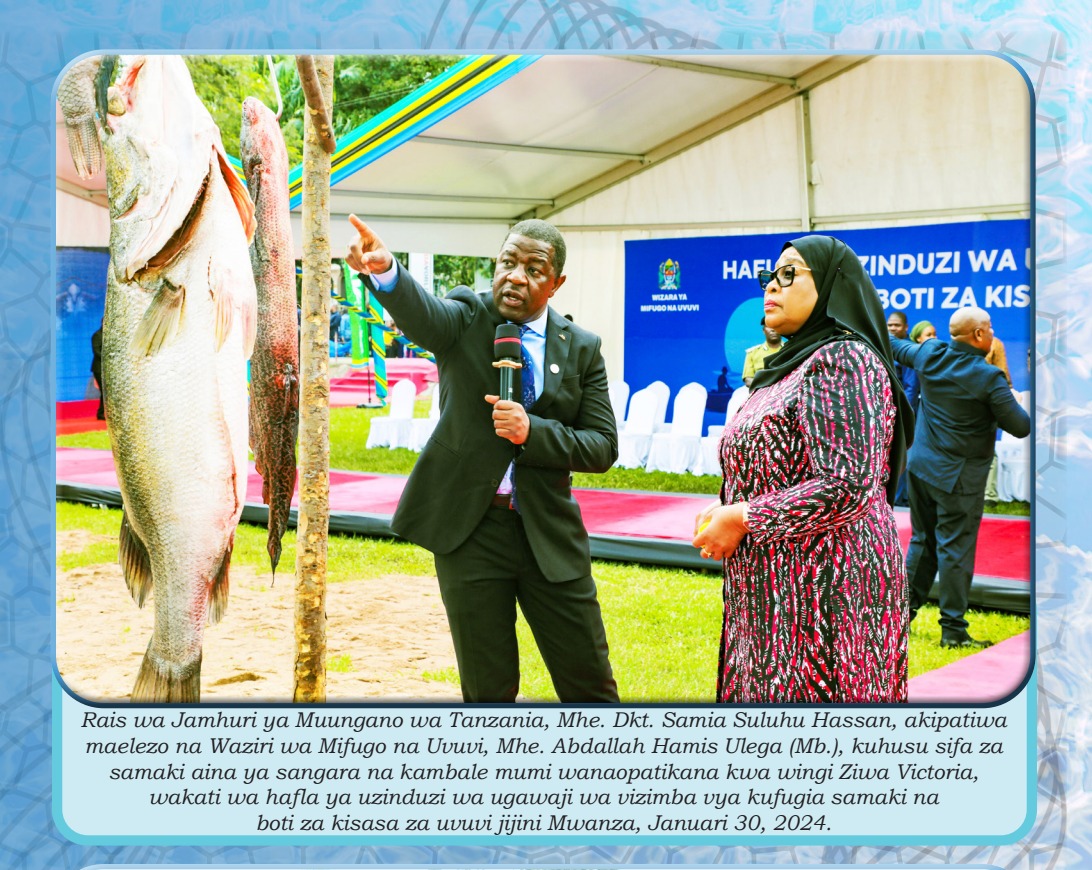The fisheries sector, a vital component of Tanzania’s economy, has been the focus of significant investments and improvements as highlighted in the budget speech delivered by Hon. Abdallah Hamis Ulega (MP), Minister of Livestock and Fisheries. The government’s strategic initiatives aim to boost fish production, improve market access, and enhance the livelihoods of fishing communities.
One of the key highlights of the budget speech -2024/5 is the rehabilitation of fish markets across the country. Upgraded markets are essential for maintaining the quality of fish products and ensuring that fishers can sell their catch at fair prices. The rehabilitation efforts include the construction of modern facilities equipped with cold storage units to prevent spoilage and extend the shelf life of fish. This infrastructure development is expected to significantly reduce post-harvest losses, which have been a major challenge for the sector.
In addition to market rehabilitation, the installation of ice-making machines in key fishing areas has been a game-changer. These machines provide a steady supply of ice, which is crucial for preserving fish immediately after capture. By maintaining the cold chain from the point of capture to the market, the quality and safety of fish products are ensured. This initiative not only benefits the fishers by reducing spoilage but also enhances consumer confidence in the freshness and quality of locally caught fish.
The budget also emphasized the provision of concessional loans for fish farming equipment and inputs. These loans are part of the government’s broader strategy to promote aquaculture as a sustainable alternative to traditional fishing. Aquaculture has the potential to significantly increase fish production and reduce pressure on natural fish stocks. The concessional loans make it easier for fish farmers to invest in necessary equipment such as fish cages, feeds, and water quality monitoring tools. By supporting aquaculture, the government aims to diversify the sources of fish production and ensure a stable supply of fish to meet the growing demand.
Another major focus of the budget is the construction of demonstration farms. These farms serve as training and innovation hubs where fish farmers can learn about best practices in fish farming. The demonstration farms showcase modern aquaculture techniques, including the use of advanced feeds, disease management strategies, and efficient water use practices. By disseminating knowledge and skills through these demonstration farms, the government aims to improve the productivity and sustainability of fish farming operations across the country.
The budget speech by Hon. Abdallah Hamis Ulega (MP) also highlighted the distribution of 270 fish cages to small-scale fish farmers. These cages are designed to enhance fish farming efficiency by providing a controlled environment for fish growth. The use of fish cages allows for better management of feeding, disease control, and harvesting, leading to higher yields and better quality fish. The distribution of fish cages is part of the government’s effort to support small-scale fish farmers and promote inclusive growth in the fisheries sector.
In addition to supporting fish farming, the government has made significant strides in strengthening fishery management. Training programs have been conducted for 1,328 members of Community Fisheries Management Groups. These programs cover various aspects of resource management, conflict resolution, leadership, and financial management. By empowering community members with the necessary skills and knowledge, the government aims to promote sustainable fishing practices and ensure the long-term health of fishery resources.
The budget also outlines plans to complete the construction of the Kilwa Masoko fishing port and other fish markets and landings. These facilities are crucial for improving the efficiency of the fisheries supply chain and ensuring that fish products can reach markets quickly and in good condition. The new and upgraded facilities will also provide better working conditions for fishers, enhancing their productivity and overall well-being.
Furthermore, the government is committed to improving the quality and safety of fish products through modern equipment and infrastructure. This includes the establishment of fish processing plants and quality control laboratories equipped with the latest technology. These facilities will help in maintaining high standards of hygiene and quality, making Tanzanian fish products more competitive in both domestic and international markets.
The budget speech also highlighted the importance of international collaboration in the fisheries sector. The government plans to work closely with international organizations and development partners to implement best practices and benefit from global expertise. These collaborations are crucial for addressing transboundary fishery issues and ensuring that Tanzania’s fisheries sector adheres to international standards.
In conclusion, the growth in the fisheries sector as outlined in the budget speech by Hon. Abdallah Hamis Ulega (MP) reflects the government’s strategic investments and innovations aimed at boosting fish production, improving market access, and enhancing the livelihoods of fishing communities. By focusing on market rehabilitation, aquaculture promotion, infrastructure development, and capacity building, the government is laying a strong foundation for a sustainable and prosperous future for Tanzania’s fisheries sector.
Growth in the Fisheries Sector: Tanzania’s Strategic Investments and Innovations
